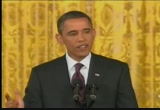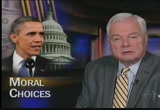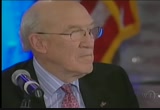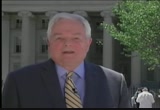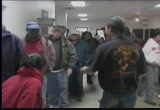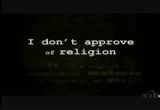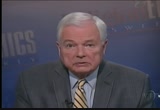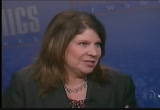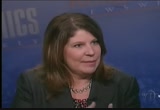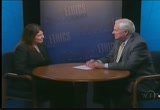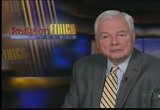tv Religion Ethics Newsweekly WHUT July 3, 2011 8:30am-9:00am EDT
8:30 am
coming up -- the moral arguments in washington's sharp debate over raising the debt limit and reforming the budget. >> you can't tax your way out of this baby, and you can't cut spending as your way out of this baby. it has to be a blend. also, a homeless shelter in montana called god's love. as its founders prospered, they gave much of their money away. >> usually, when they got any money their first thought is, "who can we bless? who can we give this money to?" major funding for "religion & ethics newsweekly" is provided by the lily endowment, an indianapolis-based private
8:31 am
family foundation dedicated to its founders' interest in religion, community development, and education. additional funding by mutual of america, designed and customized individual and group retirement products. that's why we're your retirement company. and the corporation for public broadcasting. >> welcome. i'm bob abernethy. it's good to have you with us. with an august 2nd deadline looming for raising the country's debt limit, president obama this week appealed for a solution that would require both big cuts in spending and more revenue. >> so the bottom line is this -- any agreement to reduce our deficit is going to require tough decisions and balanced solutions. the president urged congress to reach a deal now. >> if the united states government, for the first time, cannot pay its bills, if it defaults, then the consequences for the u.s. economy will be
8:32 am
significant and unpredictable. and that is not a good thing. >> we have a special report coming up later on the moral arguments in washington's intense debate over debt, spending and taxes. in new york, there were celebrations after that state legalized gay marriage. some religious groups, however, continued to voice their objection to the law. new york's catholic bishops said the law will undermine marriage and family. in a separate statement, the bishop of brooklyn warned catholic schools against bestowing any distinctions and honors on the governor or on legislators who voted for the law. in other news, palestinian leaders formally announced their decision to seek united nations recognition for an independent palestinian state in the west bank, gaza strip and east jerusalem. mahmoud abbas, head of the
8:33 am
palestinian authority, said he will ask the u.n. general assembly to vote on the issue in september. however, in order to become an official member of the u.n., the palestinians would need the support of the security council, and the u.s. would most likely veto such an effort. there were new guidelines released this week for christian missionaries. the document comes from the world council of churches, the vatican and the world evangelical alliance, which together they say represent 90% of the world's christians. the groups urge christians to reject violence or any "coercive" methods while attempting conversions. they also say members of other religions should be treated with respect. creators of the document say they hope to reduce the tensions that can sometimes arise when christians proselytize in non-christian societies. we have a report today on the moral choices involved in
8:34 am
the intense negotiations underway in washington over what to do about the country's $14.3 trillion debt. if the debt ceiling is not raised by august 2nd, in just one month, the treasury department says for the first time in american history the government will not have enough money to meet all its obligations. the administration wants congress to raise the debt ceiling so the government can borrow more to pay those bills. but many members of congress say they want, first, a believable long-term plan to reduce the deficit. so far, there's no agreement on such a plan, so the debt limit remains, and so does the countdown to default. all over washington, from congress to the white house, among the "k" street lobbies, at the think tanks and at scores of conferences and panels, experts are trying to solve the problem. one experienced voice has been that of retired republican senator alan simpson of wyoming.
8:35 am
he was the co-chair of last year's special presidential commission on the debt. >> if we don't get a plan out of this by august 2nd, then hold on tight. >> and "hold on tight" implies what? >> implies inflation. it implies that ñeople who are going to loan us money want more interest first. it will be a different lifestyle for americans, and inflation will eat through the system, and the littlest guys will be the ones most hammered. >> if we don't raise the debt limit, we would probably have a crash in the market and it would be very serious. >> i think we are talking about a moral issue. we do not want to leave our children and our grandchildren with a worse economy and a much harder life than we are enjoying. there's no mystery about the cause of the debt problem.
8:36 am
as the number of older americans has gone up, so have the costs of the so-called "entitlements" -- medicare, medicaid and social security. new medical technology drives up health care costs, and two wars have gone unpaid for. it's estimated that the war in afghanistan will is costing $120 billion this year. >> to borrow without limit and without thinking how we are going to pay this back seems to me stupid and immoral. >> for somepson, there is also the problem of selfishness. >> don't blame it all on congress. blame it on the american people who sent people to washington to bring home the bacon. and the way you got reelected was you just went and got it for them. and now the pig is dead. there's no more bacon to bring home. >> solving the debt problem is not only an economic and political challenge.
8:37 am
the crisis raises philosophical and moral questions about what kind of government and society americans want. last april, the conservative majority in the house of representatives passed a budget for next year proposed by the chair of its budget committee, paul ryan. he outlined his plan to the american enterprise institute. >> the budget begins by lowering taxes, with top individual and corporate rates capped at 25%. and we can get real growth and competition in america. >> and then -- >> it cuts $6 trillion in spending from the president's budget over the next ten years. it is not just a budget. it is a cause. >> the conservative cause of reducing the size of government. michael gerson, a former white house speech writer, is a columnist for "the washington post." >> i think it is fair to say that conservatives are not just interested in a balanced budget. conservatives want a limited government, which is, you know,
8:38 am
a smaller government, a less expansive government. that's really a conservative argument here that too much government undermines the independence and responsibility of citizens. >> the ryan budget drew sharp criticism from many in the religious communities, among them former congressman and ambassador tony hall. >> we need to get our financial house in order, but not on the backs of the poor and hungry. they didn't get us into the current mess and hurting them is not the way out of it. >> jim wallis is the editor of "sojourners" magazine. >> those of us who are christians are bound by jesus' command to protect the least of these the most. so we ask what would jesus cut? >> the two chairmen of the catholic bishops committees on domestic and international justice wrote congress expressing their "serious concern." so did 75 scholars, most of them at the catholic university of america.
8:39 am
sister simone campbell, executive director of the catholic social justice lobby network, says she and others oppose the house budget because it does not seem to reflect catholic social teaching. >> the essence of catholic social teaching is that it is based on the dignity of the human person, that we all have dignity because we are created by god. that together in society we hold shared responsibility for each other. government's role then becomes to ensure that the least are cared for. i can't believe that it is moral to cut milk products for women, infants and children who are living in poverty, to cut food for families who are poor, to push people off of healthcare coverage. that's not moral. that's immoral in my book. that's why it's so chilling to us to watch what is going on in congress about the budget.
8:40 am
it's the very safety net programs that the current budget fight is targeting. and to me this is wrong. it, quite frankly, it's immoral. >> congressman ryan, too, is catholic. he agrees that the poor and sick should not be hurt, but he insists the way to avoid that is to keep taxes low so private investors can create new jobs. >> that's just wrong. the wealthy have recovered to prerecession levels. are they investing in jobs? no. and what about leaving massive debt to our children? i think it's not a good idea. but there is a simple fix. you can solve the issue in a very simple way. raise revenues. not something easy to do. >> as the moral debate sharpened, ryan wrote a letter to the president of the catholic bishops conference, new york archbishop timothy dolan, insisting that his budget does indeed respect catholic social teaching. the archbishop replied that he was happy to hear that. in the midst of the arguments, there was a brief diversion over the ideas of ayn rand, the late atheist writer and philosopher whose book, "the fountainhead," and a movie based on it, were popular in the 1950s. rand preached a radical, small government, everyone for himself
8:41 am
libertarianism which some congressmen, among them paul ryan, said they had admired. a liberal blogger tried to discredit them with a film contrasting rand's selfish individualism with the teachings of jesus. in spite of all the claims and charges, many observers do see middle ground. >> you can't tax your way out of this baby, and you can't cut spending as your way out of this baby. it has to be a blend. >> but all the moral debate has not made compromise easy. >> i think moral motivations in politics are very important. but when you claim that your own views somehow have a divine sanction, you are cutting off all political argument. this should be an argument about outcomes, what is best for the justice and decency of a society. i think a limited government is important to that, and i think a government that provides for the most vulnerable people in society is important to that as
8:42 am
well. that's where a lot of americans are. >> alan simpson thinks his former colleagues will head off a national crisis and that their constituents will accept the need for sacrifice. >> i think there are a lot more heroes in congress than we recognize. >> gerson and rivlin say they, too, are at least somewhat optimistic. >> you are going to have to have republican and democratic leaders come together around this. they're very dug in, but there is no other choice. >> there will be a lot of posturing and a lot of difficulty, but we will raise the debt ceilingñand over the next several years. we will bring our debt under control. >> alice rivlin was the director of the budget offices at both congress and the white house. she served on two budget commissions. she says last year there were unofficial focus groups in 26 cities that were asked to work on the debt problem. when they heard the facts, rivlin says, each of them was able to work out a plan. not all of them came up with the
8:43 am
same solution, but no one failed to reach agreement on something. it seems to be quite different for congress and the white house, raising the question whether the federal government can compromise and act on any issue as difficult as this one, with so much moral passion and partisan ideology. more on this with our managing editor, kim lawton. kim? >> bob, the religious community continues to be very involved in this debate, bringing some of that moral passion and they are lobbying on both sides, all sides of this issue. this week, we had 24 religious and charitable organizations writing a letter to the administration and congressional leaders saying in all of your debt ceiling discussions, don't forgot about the poor, the vulnerable, the least of these, what they called them. and, on the other side, you had religious conservatives lobbying congress, saying don't accept any debt ceiling solution that doesn't include dramatic spending cuts. and they also used moral language, saying it's wrong to leave debt to our children, using a biblical passage to
8:44 am
support that. so, again, energy on all sides on this moral question. >> that's right. and morally and ideologically, it spills over into the whole idea of a smaller government, which of course is what the conservatives want very much. >> and that's a big issue on the campaign trail, too, which is really heightening all of the political rhetoric on capitol hill, out on the campaign trail. so, many of the gop candidates are out there really appealing to the conservative base, talking about these issues. michele bachmann, the new gop candidate, who is an evangelical christian, very much reaching out to her base, saying, "i'm not going to support, i'm not going to vote for any debt ceiling measure that doesn't include dramatic spending cuts." and, of course, you know religious conservatives are so important for the gop during this period because about 40% of republican primary voters are self-identified evangelicals so, everybody's sort of reaching out to them, seeing it as a big stepping stone.
8:45 am
>> do they have any favorites so far? >> they seem to be pretty divided still. michele bachmann polled very well in iowa this week, which surprised a lot of people. she's very popular among those very conservative, religious groups. but there are disagreements among evangelicals. some take a more moderate point of view -- evangelical leaders in a recent poll, like tim pawlenty, minnesota governor. but he's not as well known nationally. so there's still seems to be a lot of room for jockeying among evangelicals. >> meanwhile, there's the whole issue of 14 million people who can't find jobs. >> and that's the big issue that's really dominating everything and people are jockeying for a solution, and no one seems to have a good solution. so indeed, that's really been overshadowing so many of the other issues that you often hear about early in a campaign and that's what you see the candidates talking about, and obviously, that's what you see members of congress wrestling over with the administration, as well. >> kim lawton, many thanks.
8:46 am
>> we have a lucky severson story today about a coin dealer in montana, and his wife, both catholics, who have earned and given away millions of dollars to help the poor, especially the homeless. they say their policy toward people who need help is one of unconditional love. their homeless shelter is called "god's love." >> i sold a silver dollar about three years ago for $525,000. >> the book of matthew says it's easier for a camel to go through the eye of a needle than for a rich man to get into heaven. wayne miller takes that scripture seriously. >> i have a concern for these people when they go up, and i believe in a heaven and a non-heaven, when they go up there how are they going to explain, you know, what they've done with their money? >> miller knows about money. he's made enough of it. his little coin shop in downtown
8:47 am
helena, montana, has done more than $325 million in business since it opened 45 years ago. this is his son, dave. >> seriously, when they get any money their first thought is who can we bless? who can we give this money to? i say that out of every $1,000 my dad gives $999 of it away without even thinking. >> over the years, miller has given away millions of dollars to charities all over the world, especially to the people of helena. he knows that some have taken advantage of his and his wife's generosity but says they would rather err on the side of love. >> god doesn't ask you about your ability or your inability. he asks you about your availability, and we happened to be available at a time when people were wanting to start a shelter. >> they called it god's love, and as homeless shelters go this one stands apart. >> unconditional love, you know, everybody talks about that, but what that means to us is that before they ever walk in the door the first time, we already love them.
8:48 am
we don't wait to see who they are or how they act or what their problem is or if they're lazy. we already love them. >> joe wojton, one of god's love managers, has worked in other shelters around the country. >> everybody who comes through our door are people with problems, not problem people, and we treat everybody with love when they come through our door because we realize the people we're seeing-some have never been homeless before. this is a very scary experience, and we try to love them up the best we can. >> the shelter usually accommodates about 40 homeless downstairs and has rooms for nine families upstairs. but most of the people they feed here are not homeless. they have jobs and live in the community. dave miller: people rely on us in the middle of the month to eat down here. they know the food stamps and the food boxes are only going to make it a couple of weeks, so they rely on us to come down, on their ability to come down and eat. >> it doesn't take a lot of misfortune to be on the street these days. i think everybody in america
8:49 am
knows that right now. >> dave miller runs god's love and gives 10 percent of his salary back to the shelter. >> yeah, we've seen a big change. every day we have families that come in and say, "my husband had a great job making a lot of money. he got laid off. we can't make next month's rent." unfortunately, it used to be just couples. now we're seeing them with children. >> people like john and krista loweman, who is pregnant. both were employed in south carolina until they lost their jobs and came west looking for work and landed here. so you came here looking for work? >> yes, looking for work, anything, just a better life for me, my wife and my baby. >> but there was no jobs? >> no, sir. >> nothing, not even for me, and i've been to school. >> we tell them that they can have three days no questions asked, just rest, eat, do their laundry, but after that they have to have a plan, and their plan usually is to find a job. but they can't find a job. >> but if they can't find a job, it doesn't mean they have to
8:50 am
leave, as long as they keep looking. >> you have to put in five applications a day at least, and i do that every day but, you know, it's kind of hard. >> it's better than living in a car, though. >> better than living in a car. you lived in a car for how long? >> six weeks. >> darcy pfeiffer and her husband and baby boy live here. he works, but can't afford the rent. brenda rutecki's husband died a year ago. she had no income, couldn't get a job, came here while she attended school to become a certified nursing assistant. >> you can't get a job if you don't have a phone. you can't get a job if you don't have a car. you can't get a job if you don't even have an address. so this is like our holding spot. we're all good families. we're all good people, but you've got to have a start, and that's what they give us. >> one of the first things the millers did was create a park next door to god's love just for the homeless. having a homeless shelter and a park near the center of town was
8:51 am
not exactly pleasing to local businessmen. but toby dewolf, owner of bert and ernies, says any opposition has faded away. >> i've been here 25 years, and i have never seen a better run shelter. i don't think there's a problem. i don't think that anybody has seen an issue with any kind of violence or crime or anything by any means with having a shelter down here. >> the millers both graduated from catholic university in washington, d.c. with master's degrees. they have nine children, four of them adopted, and all of them, according to their father, are involved in one charity or another. there was a time when wayne miller, who is an expert on silver dollars, was measuring his life by the increasing value of his personal coin collection. >> you know, i open up these catalogs, and they've got coins there, $30,000 or $40,000, $50,000 coins that i would dearly love to have, and i look
8:52 am
at them and i say okay, i chose my path. if i did that i would be obsessed with that, and again, my whole measurement would be how advanced is your coin collection? and i didn't want that to be. >> it doesn't mean the millers live in poverty. they travel, eat in the best restaurants, live in a very nice home with a swimming pool, but customers often wonder how successful a man can be if he rarely wears shoes. >> people say can't you afford to wear shoes, and i say i can afford not to have to wear shoes. >> he provides the bulk of the funding for god's love, millions of dollars over the years, but the shelter also receives a federal grant, money from the united way and from other private donors. >> it's amazing when i go out to a church or to the local college, and i speak, and i hear from people, and they say, "oh, we just thought the millers pay for everything," and that's not the case. wayne and ann are wonderful, and wayne donates a lot of money to god's love, but we need the entire community effort to keep
8:53 am
god's love up and operating every year. >> and i think over the years we've learned to love god more and more, and he's always been there for us. when we were thinking that maybe we weren't going to have enough money or whatever, he's always supplied it. it's been wonderful-abundance, just like the bible says. >> the millers are also helping in various ways about 150 helena families who don't live in the shelter. altogether, he gives away about one-third of his gross income and is firmly convinced that it's what god wanted him to do. >> i can't imagine what it's going to be like. i'm fascinated to learn what it's going to be like, but i am as certain as i can be that there is an afterlife and that i'm really going to have fun. >> the truth is he's having a pretty good time right now. for "religion and ethics" newsweekly, i'm lucky severson in helena, montana. >> on our calendar this week, members of the baha'i faith
8:54 am
commemorate the martyrdom of their founder, the bab, who was executed in persia july 9th, 1850. bahai's suspend work on this day. >> finally, the vatican has launched a new website and the announcement came this week by way of the first ever papal tweet. >> with some help from vatican officials, pope benedict logged onto to twitter on his ipad and sent out a short message to followers. "i just launched news.va," wrote the pope. "praised be our lord jesus christ." the new website features news from various vatican outlets including its radio and television stations, newspaper and press office. after the pope's tweet, more than 50,000 people now follow the site on twitter. >> that's our program for now. i'm bob abernethy. you can also follow us on twitter and facebook, find us on youtube, and watch us anytime,
8:55 am
anywhere on smart phones and iphones. there's also much more on our web site, you can comment on all of our stories and share them. audio and video podcasts are also available. join us at pbs.org. as we leave you, scenes from an interfaith worship service held at the washington national cathedral last weekend.
8:56 am
major funding for "religion & ethics newsweekly" is provided by the lily endowment, an indianapolis-based private family foundation dedicated to its founders' interest in religion, community development, and education. additional funding by mutual of america, designed and customized individual and group retirement products. that's why we're your retirement company. and the corporation for public broadcasting.
205 Views
IN COLLECTIONS
WHUT (Howard University Television) Television Archive
Television Archive  Television Archive News Search Service
Television Archive News Search Service 
Uploaded by TV Archive on

 Live Music Archive
Live Music Archive Librivox Free Audio
Librivox Free Audio Metropolitan Museum
Metropolitan Museum Cleveland Museum of Art
Cleveland Museum of Art Internet Arcade
Internet Arcade Console Living Room
Console Living Room Books to Borrow
Books to Borrow Open Library
Open Library TV News
TV News Understanding 9/11
Understanding 9/11

